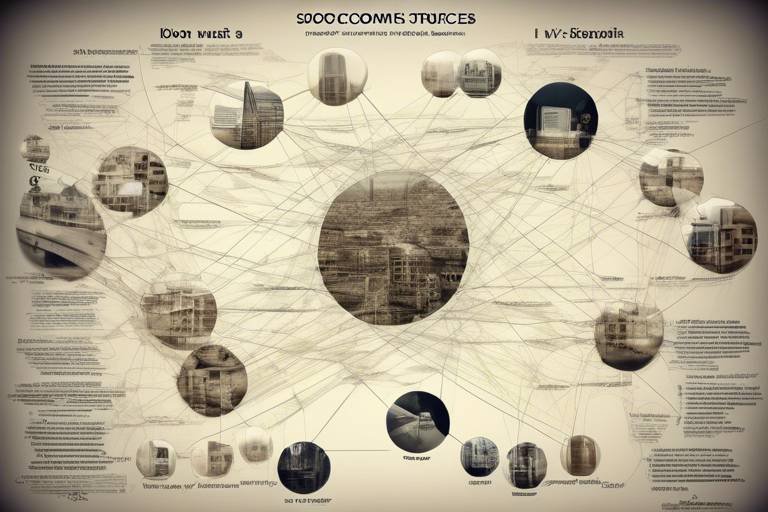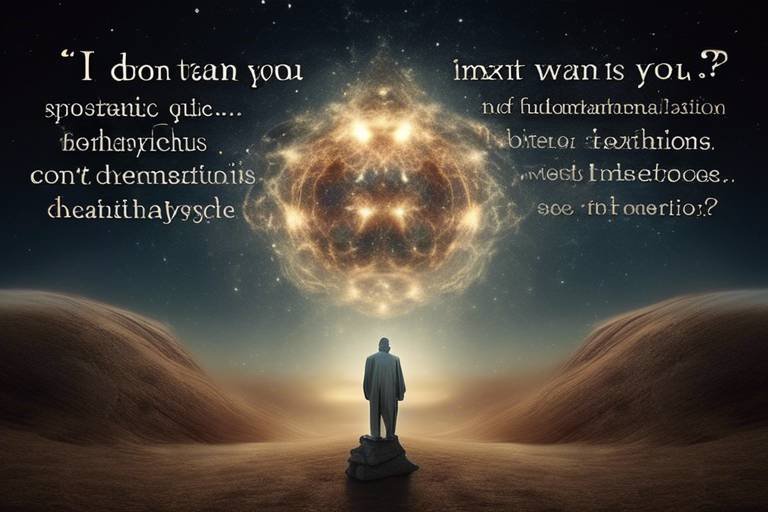Understanding the Importance of Ontological Security
In a world that often feels like it's spinning out of control, the concept of ontological security emerges as a beacon of hope and stability. But what exactly does it mean? Simply put, ontological security is the sense of stability and continuity in one's identity and beliefs. It's that comforting feeling that you know who you are and what you stand for, even when the world around you is in chaos. Imagine walking on a tightrope; without that strong sense of self, one misstep could send you tumbling into uncertainty.
Ontological security is not just a personal affair; it plays a significant role in the societal fabric as well. Think about it: when individuals feel secure in their identities, they contribute to a more stable community. This sense of security is crucial for navigating the complexities of modern life, where change is the only constant. As we delve deeper into this topic, we will explore how ontological security shapes our perceptions of identity, stability, and trust. We'll also examine its implications for both individuals and societies, revealing why it matters more than ever in today's rapidly changing world.
As we embark on this exploration, consider the following key points:
- Ontological security helps individuals maintain a coherent sense of self.
- It fosters resilience and coping mechanisms in times of adversity.
- Collective identities contribute to societal stability and cohesion.
So, why should we care about ontological security? Because it influences our mental health, shapes our social interactions, and ultimately determines how we navigate life's challenges. In the upcoming sections, we will uncover the historical context, philosophical foundations, and psychological implications of ontological security, providing a comprehensive view of its importance in our lives.
- What is ontological security?
Ontological security refers to the stability and continuity in one's identity and beliefs, which is essential for navigating uncertainties in life.
- Why is ontological security important?
It helps individuals maintain a coherent sense of self, fosters resilience, and contributes to societal stability.
- How does ontological security relate to mental health?
A stable sense of self is linked to better mental health outcomes, allowing individuals to cope more effectively with challenges.

The Concept of Ontological Security
Ontological security is a fascinating concept that often flies under the radar, yet it plays a vital role in our lives. At its core, ontological security refers to the sense of stability and continuity in one's identity and beliefs. Think of it as the bedrock upon which our personal and collective identities are built. Just like a house needs a solid foundation to stand tall, we need a stable sense of self to navigate the complexities of life. Without this stability, we might feel lost, anxious, or overwhelmed by the uncertainties that life throws our way.
Imagine waking up each day unsure of who you are or what you believe. Sounds unsettling, right? This feeling of instability can lead to a crisis of identity, where individuals struggle to find their place in the world. Ontological security provides a framework that helps us make sense of our experiences, allowing us to construct a coherent narrative about ourselves. It’s the glue that holds our beliefs and experiences together, giving us a sense of belonging and purpose.
In a world that is constantly changing—think rapid technological advancements, shifting cultural norms, and unpredictable global events—ontological security becomes even more crucial. It allows individuals and societies to maintain a coherent sense of self amidst chaos. When we feel secure in our identity, we are better equipped to handle challenges and adapt to new circumstances. This is especially important in today's fast-paced society, where change is the only constant.
Moreover, ontological security is not just an individual experience; it extends to societal contexts as well. Communities and nations also require a sense of stability and shared identity to function effectively. When groups of people share common beliefs, values, and narratives, they create a collective sense of ontological security that fosters social cohesion. This is why national identities, cultural heritage, and shared histories play such a significant role in shaping our understanding of ourselves and our place in the world.
To further illustrate the importance of ontological security, consider the following key aspects:
- Identity Formation: Ontological security is essential for the development of a stable identity, allowing individuals to understand who they are in relation to others.
- Coping Mechanism: A solid sense of self serves as a protective factor, helping individuals cope with stress and adversity.
- Social Cohesion: Shared beliefs and values within a community contribute to a collective sense of security, enhancing social bonds.
In conclusion, ontological security is a multifaceted concept that plays a significant role in both individual and societal contexts. It shapes our perceptions of identity, stability, and trust, ultimately influencing how we navigate a rapidly changing world. Understanding this concept is crucial for recognizing the importance of a stable identity in fostering resilience and social cohesion.
- What is ontological security? Ontological security refers to the sense of stability and continuity in one's identity and beliefs, essential for navigating uncertainties.
- Why is ontological security important? It helps individuals and societies maintain a coherent sense of self, enabling resilience in the face of challenges.
- How does ontological security affect mental health? A stable sense of self contributes to better mental health and coping mechanisms during stressful times.

Historical Context
Understanding the historical development of ontological security provides essential insights into its relevance today. The evolution of this concept is deeply intertwined with various philosophical and sociological perspectives that have emerged over centuries. To grasp the significance of ontological security, we must look back at how our understanding of identity and security has transformed through time. From early philosophical inquiries to contemporary societal challenges, ontological security has played a pivotal role in shaping our collective and individual identities.
The journey of ontological security can be traced back to the philosophical foundations laid by thinkers who pondered the nature of self and existence. For instance, the existentialists, like Jean-Paul Sartre and Simone de Beauvoir, emphasized the importance of personal experience and choice in forming identity. Their ideas resonate with the notion that a coherent sense of self is essential for navigating the complexities of life. In contrast, social constructivists argue that our understanding of reality is not just an individual endeavor but is significantly influenced by our interactions with others. This perspective highlights how societal norms and shared beliefs contribute to our ontological security.
Throughout history, various events have underscored the importance of ontological security. For example, the aftermath of World War II saw nations grappling with a fractured sense of identity. As countries rebuilt, they turned to shared narratives and collective memories to foster a sense of stability. This period marked a significant shift in how societies viewed their identities, leading to a more profound understanding of the need for ontological security in the face of adversity.
Furthermore, the rise of globalization in recent decades has introduced new challenges to ontological security. As cultures collide and intermingle, individuals and societies are often left questioning their identities. This dynamic can lead to a sense of insecurity, as traditional beliefs and values are challenged by new influences. The interplay between local identities and global forces creates a complex landscape where ontological security must be continuously negotiated.
In summary, the historical context of ontological security reveals a rich tapestry of ideas and events that have shaped our understanding of identity and stability. From philosophical debates to the impact of global changes, the quest for ontological security remains a vital aspect of human existence. Understanding this context not only enriches our knowledge of the concept but also highlights its ongoing relevance in today's rapidly changing world.
- What is ontological security? Ontological security refers to the sense of stability and continuity in one's identity and beliefs, crucial for navigating uncertainties in life.
- Why is historical context important for understanding ontological security? Historical context helps us see how philosophical and sociological perspectives have shaped our understanding of identity and security over time.
- How does globalization affect ontological security? Globalization introduces new cultural influences that can challenge traditional identities, leading to feelings of insecurity and the need for negotiation of self-concept.

Philosophical Foundations
When we dive into the of ontological security, we encounter a rich tapestry of ideas that have shaped our understanding of identity and existence. Philosophy, at its core, is a quest for meaning, and it profoundly influences how we perceive our place in the world. Think about it: our sense of self is not just a mere reflection of our thoughts or feelings; it is deeply intertwined with the narratives we construct around our existence. This is where the philosophies of existentialism and social constructivism come into play, each offering unique insights into the nature of identity.
Existentialist thinkers, such as Jean-Paul Sartre and Simone de Beauvoir, argue that individuals are not born with a pre-defined essence but instead create their own identities through choices and experiences. This notion resonates deeply with ontological security, as it emphasizes the importance of personal agency in constructing a stable sense of self. In a world that often feels chaotic and unpredictable, the ability to define oneself becomes a source of strength and resilience. Consider how an artist might find their identity through their work, transforming raw emotions into a coherent narrative that not only reflects their inner world but also provides a sense of continuity in the face of change.
On the other hand, social constructivism shifts our focus from the individual to the collective. Think of it this way: while existentialism champions the lone individual, social constructivism highlights the importance of social interactions in shaping our reality. According to this perspective, our identities are constructed through our relationships with others and the cultural contexts we inhabit. For instance, the language we use, the traditions we uphold, and the communities we belong to all play a crucial role in forming our sense of self. This interconnectedness underscores the idea that ontological security is not merely a personal endeavor; it is also a communal one, where shared beliefs and values create a stable environment for individuals to thrive.
To illustrate this further, let’s consider a table that summarizes these philosophical perspectives:
| Philosophical Perspective | Key Idea | Relation to Ontological Security |
|---|---|---|
| Existentialism | Identity is created through choices and experiences. | Personal agency fosters a stable sense of self. |
| Social Constructivism | Identity is shaped by social interactions and cultural contexts. | Communal beliefs contribute to collective stability. |
In essence, the philosophical foundations of ontological security reveal a duality in our understanding of identity: it is both an individual journey and a collective experience. The interplay between personal agency and social context creates a dynamic landscape where individuals can navigate the complexities of life, finding stability in their identities amidst the ever-changing world around them. As we reflect on these philosophical insights, we can appreciate how they inform our understanding of ontological security and its profound impact on our lives.

Existentialism and Identity
Existentialism is a philosophical movement that dives deep into the intricacies of human existence, emphasizing the importance of individual experience and personal choice. At its core, existentialism suggests that we are not merely products of our environment or predetermined by societal norms; rather, we are the architects of our own identities. This perspective is particularly relevant when discussing ontological security, as it highlights the quest for meaning in a world that often feels chaotic and unpredictable.
Imagine standing at a crossroads, with multiple paths stretching out before you. Each path represents a different choice, a different aspect of your identity. Existentialist thinkers like Jean-Paul Sartre and Simone de Beauvoir argue that the choices we make define who we are. This idea resonates with the concept of ontological security because having the freedom to choose fosters a sense of stability and continuity in our identities. When we actively shape our lives through decisions, we cultivate a coherent sense of self, which is essential for navigating life's uncertainties.
Moreover, existentialism posits that the search for meaning is a fundamental aspect of the human condition. In a world that can often feel overwhelming, we naturally seek out frameworks that provide us with a sense of purpose. This is where ontological security comes into play; it acts as a protective shield against the existential dread that arises from uncertainty. By establishing a stable identity, individuals can better cope with life's challenges and maintain their mental well-being.
However, the journey towards achieving ontological security is not without its hurdles. The existentialist perspective reminds us that we must confront and embrace our freedom, which can be both liberating and terrifying. This duality is crucial to understanding how our identities are formed. The struggle to define ourselves often leads to moments of doubt and confusion, but it is through these experiences that we can ultimately find clarity and strength.
In summary, existentialism provides valuable insights into the relationship between identity and ontological security. By recognizing the significance of personal choice and the quest for meaning, we can better understand how individuals navigate the complexities of their lives. As we embrace our freedom to choose, we cultivate a stronger sense of self, enabling us to face the uncertainties of life with resilience and confidence.
- What is ontological security? Ontological security refers to the stability and continuity of one's identity and beliefs, allowing individuals and societies to navigate uncertainties.
- How does existentialism relate to identity? Existentialism emphasizes individual experience and choice, suggesting that our identities are shaped by the decisions we make.
- Why is ontological security important? It helps individuals maintain a coherent sense of self, which is essential for mental health and resilience in the face of adversity.
- Can ontological security be disrupted? Yes, various factors such as societal changes, personal crises, or global events can challenge one's sense of ontological security.

Social Constructivism
Social constructivism is a fascinating lens through which we can view our understanding of reality and identity. At its core, this theory posits that our perceptions of the world are not merely reflections of an objective reality, but rather are shaped significantly by our social interactions and cultural contexts. Imagine a child learning to speak; they don't just absorb words like a sponge. Instead, they engage with their surroundings, picking up language cues from parents, peers, and the media. This process illustrates how our identities and beliefs are constructed through social experiences.
In the realm of ontological security, social constructivism plays a pivotal role. It suggests that our sense of self is not an isolated phenomenon but is intimately connected to the communities we belong to. For instance, consider how different cultures have unique narratives that shape their collective identity. These narratives provide individuals with a sense of belonging, stability, and continuity. When we share stories, traditions, and values, we reinforce our identities and create a collective understanding of who we are.
Moreover, social constructivism highlights the importance of language in shaping our realities. The words we use can either empower or limit our understanding of ourselves and our relationships with others. For example, terms like “us” and “them” can create divisions, while inclusive language fosters a sense of community. This linguistic aspect of social constructivism is crucial for maintaining ontological security, as it influences how we perceive our place in the world and our connections with others.
As we navigate through life, the social constructs we encounter can either bolster or undermine our ontological security. In a rapidly changing society, where globalization and technological advancements challenge traditional identities, individuals may experience a crisis of self. The fluidity of identity in modern times can lead to feelings of uncertainty and instability. Thus, understanding social constructivism helps us grasp how collective beliefs and societal norms can either provide a comforting anchor or contribute to existential anxiety.
To illustrate the nuances of social constructivism, let's consider a table that outlines some key differences between individualistic and collectivistic cultures:
| Aspect | Individualistic Cultures | Collectivistic Cultures |
|---|---|---|
| Identity | Self is independent, focused on personal achievement | Self is interdependent, focused on group harmony |
| Values | Freedom, autonomy, self-expression | Community, loyalty, family ties |
| Conflict Resolution | Direct confrontation, assertiveness | Indirect communication, maintaining face |
In conclusion, social constructivism offers a profound perspective on how our identities are shaped by the social contexts we inhabit. By understanding the interplay between individual experiences and collective beliefs, we can better appreciate the complexities of ontological security. As we continue to navigate an increasingly interconnected world, recognizing the significance of social constructs will be vital in fostering resilience and stability in our identities.
- What is ontological security? Ontological security refers to the sense of stability and continuity in one's identity and beliefs, essential for navigating uncertainties in life.
- How does social constructivism influence identity? Social constructivism suggests that our identities are shaped by social interactions and cultural contexts, emphasizing the role of community in forming our sense of self.
- Why is language important in social constructivism? Language shapes our perceptions of reality and can influence how we relate to others, impacting our ontological security.
- What challenges does globalization pose to ontological security? Globalization can lead to identity crises as traditional narratives and cultural norms are challenged, creating feelings of instability.

Psychological Implications
Ontological security is not just a philosophical concept; it has profound that can greatly influence mental health and overall well-being. Imagine your sense of self as a house: if the foundation is shaky, the entire structure is at risk. Similarly, a stable sense of self is crucial for individuals to develop resilience and effective coping mechanisms, especially when faced with life's inevitable adversities.
When individuals possess a strong sense of ontological security, they often exhibit greater emotional stability. This is because they have a coherent narrative about who they are and where they fit in the world. In contrast, those who struggle with their identity may experience feelings of anxiety and disorientation, akin to navigating through a foggy landscape without a map. This lack of clarity can lead to a host of psychological issues, including depression and anxiety disorders.
Moreover, ontological security influences how we relate to others. A secure sense of self fosters healthy relationships, as individuals are more likely to trust and engage with others authentically. Conversely, when people are unsure of their own identities, they may project insecurity onto their relationships, leading to misunderstandings and conflicts. This dynamic can create a vicious cycle where insecurity breeds more insecurity, making it challenging to build meaningful connections.
Additionally, ontological security plays a significant role in how we cope with change. In today's fast-paced world, change is often the only constant. Those who have a stable sense of identity are generally better equipped to handle transitions, whether they be personal, such as a job loss or a relationship change, or societal, like shifts in political landscapes. They are like trees with deep roots that can withstand strong winds, while those lacking this security may feel uprooted and lost.
| Factors Influencing Ontological Security | Impact on Psychological Well-being |
|---|---|
| Stable Relationships | Enhances trust and emotional support |
| Consistent Life Experiences | Fosters a coherent self-narrative |
| Social Support Systems | Provides a buffer against stress |
| Positive Self-Perception | Boosts confidence and resilience |
In conclusion, the implications of ontological security extend far beyond the individual. They touch every aspect of our lives, from our mental health to our interpersonal relationships. By fostering a stable sense of self, we not only improve our own psychological well-being but also contribute to a more cohesive and resilient society. So, how can we cultivate this essential aspect of our identity? Engaging in self-reflection, building strong relationships, and seeking support when needed are all essential steps toward enhancing ontological security.
- What is ontological security? - It refers to a stable sense of self and continuity in one's identity and beliefs.
- How does ontological security affect mental health? - A stable sense of self contributes to emotional stability, resilience, and effective coping mechanisms.
- Can ontological security be improved? - Yes, through self-reflection, strong relationships, and social support.
- What are the consequences of lacking ontological security? - It can lead to anxiety, depression, and difficulties in forming healthy relationships.

Ontological Security in Society
When we think about ontological security, it's easy to focus solely on the individual level, but the truth is, this concept stretches far beyond personal identity. It weaves itself into the very fabric of society, influencing how communities form, interact, and maintain stability. In essence, ontological security in society refers to the collective sense of identity and stability that groups share, which is vital for fostering trust and cohesion among members. Just like a sturdy bridge connects two banks of a river, ontological security connects individuals to their communities, providing a sense of belonging and purpose.
The importance of shared beliefs and collective narratives cannot be overstated. They serve as the glue that holds society together, creating a common framework through which people can understand their place in the world. For instance, consider how national identity plays a pivotal role in shaping a country's ontological security. When citizens share a common history, values, and goals, they are more likely to feel secure in their identity as part of that nation. This shared understanding fosters a sense of unity, making individuals more resilient in the face of external challenges.
However, it's not all smooth sailing. In our modern world, globalization has introduced complexities that can challenge ontological security at both individual and societal levels. As cultures collide and intermingle, traditional identities may feel threatened, leading to a sense of instability. For example, consider the impact of migration. While it enriches societies by introducing new perspectives and ideas, it can also create tensions as individuals grapple with shifting identities. This duality is a crucial aspect of how ontological security operates in our interconnected world.
To illustrate the dynamics of ontological security in society, let's look at a few key factors:
- Shared Narratives: These are the stories that communities tell about themselves, often rooted in history and culture. They help individuals make sense of their experiences and reinforce their connection to the group.
- Collective Memory: This refers to how societies remember and interpret past events. A shared understanding of history can enhance ontological security by providing a sense of continuity and stability.
- Social Institutions: Structures such as family, education, and religion play a vital role in shaping and maintaining collective identities. They provide frameworks within which individuals can find meaning and security.
In summary, ontological security is not just an individual concern; it is a societal imperative. As we navigate the complexities of modern life, understanding the interplay between individual identities and collective narratives can help us foster a more cohesive and resilient society. By nurturing a sense of belonging and shared purpose, we can enhance our collective ontological security, ensuring that we face the future not as isolated individuals, but as interconnected members of a vibrant community.
What is ontological security?
Ontological security refers to the stability and continuity of one's identity and beliefs, crucial for navigating uncertainties in life.
How does ontological security affect society?
It shapes collective identities and shared beliefs, contributing to the stability and cohesion of communities.
What role do shared narratives play in ontological security?
Shared narratives help individuals make sense of their experiences and reinforce their connection to the group, enhancing collective identity.
How does globalization impact ontological security?
Globalization introduces complexities that can challenge traditional identities, leading to potential instability as cultures intermingle.

National Identity
is more than just a label; it’s the very essence of how individuals within a nation perceive themselves and their place in the world. It is shaped by a myriad of factors, including history, culture, language, and shared experiences. When we talk about ontological security, the concept of national identity becomes pivotal because it provides a collective framework through which individuals can understand their existence and belonging. Think of it as a tapestry woven from the threads of shared narratives and memories, where each thread represents a unique story contributing to a larger, cohesive picture.
At its core, national identity fosters a sense of belonging and community among citizens. It creates a shared understanding of values, traditions, and goals, which can be particularly comforting in times of uncertainty. When people feel a strong connection to their national identity, they are more likely to experience a stable sense of self, which in turn enhances their ontological security. This is especially important in today's world, where globalization and cultural exchanges can sometimes dilute these identities, leading to feelings of disorientation and insecurity.
To illustrate the components that contribute to national identity, let’s take a look at the following table:
| Component | Description |
|---|---|
| History | The shared experiences and events that have shaped a nation’s past. |
| Culture | The customs, arts, social institutions, and achievements of a particular nation. |
| Language | The primary means of communication that unites people and fosters understanding. |
| Symbols | Flags, anthems, and other representations that evoke national pride and unity. |
However, the interplay between national identity and ontological security is not without its challenges. As societies become more interconnected, the traditional notions of national identity are often put to the test. For instance, consider the impact of immigration and multiculturalism. While these phenomena can enrich a nation’s cultural fabric, they can also lead to tensions as established identities are challenged. In such cases, individuals may find themselves grappling with conflicting identities, which can disrupt their sense of ontological security.
Furthermore, the rise of nationalism in various parts of the world has sparked debates about what it means to belong to a nation. Some may argue that a strong national identity is essential for maintaining social cohesion, while others may contend that it can lead to exclusionary practices that undermine the very principles of inclusivity and diversity. This dichotomy raises important questions: How do we balance the need for a cohesive national identity with the realities of a globalized world? Can we embrace multiple identities without sacrificing our sense of belonging?
Ultimately, understanding the dynamics of national identity is crucial for fostering ontological security. It allows individuals to navigate the complexities of their existence while maintaining a sense of connection to something greater than themselves. As we move forward in an ever-changing world, the challenge lies in cultivating a national identity that is both inclusive and adaptable, ensuring that all individuals feel valued and secure in their place within the national narrative.
- What is ontological security? Ontological security refers to the sense of stability and continuity in one’s identity and beliefs, crucial for navigating uncertainties.
- How does national identity affect ontological security? A strong national identity fosters a sense of belonging and community, enhancing individuals’ stability and sense of self.
- What challenges does globalization pose to national identity? Globalization can dilute traditional identities, leading to feelings of disorientation and insecurity among individuals.
- Can national identity be inclusive? Yes, it is possible to cultivate a national identity that is inclusive and adaptable, ensuring all individuals feel valued.

Globalization and Security
In today's world, the phenomenon of globalization has become a double-edged sword, impacting the ontological security of individuals and societies alike. On one hand, globalization fosters cultural exchange, economic opportunities, and a broader understanding of diverse perspectives. On the other hand, it can lead to a sense of displacement and insecurity as traditional identities are challenged and reshaped. As we navigate this intricate web of global connections, the question arises: How do we maintain our sense of self amidst such rapid change?
Globalization affects our ontological security in several profound ways. The influx of new ideas and cultural practices can enrich our identities but can also create conflicts between traditional values and modern influences. For instance, when individuals are exposed to different ways of life, they may experience a crisis of identity, leading to feelings of confusion and uncertainty. This is particularly evident in younger generations who are often caught between the expectations of their cultural heritage and the allure of a globalized world.
Moreover, the economic aspects of globalization can destabilize communities. As jobs move across borders and economies become interconnected, individuals may face job insecurity and economic pressures that challenge their sense of stability. This can lead to a collective anxiety that permeates society, eroding the trust that binds communities together. The result is a growing sense of vulnerability, as people grapple with the fear of losing their cultural identities in a homogenized world.
To illustrate these dynamics, consider the following table that outlines some of the key effects of globalization on ontological security:
| Aspect | Positive Effects | Negative Effects |
|---|---|---|
| Cultural Exchange | Broader understanding, enriched identities | Identity conflicts, cultural dilution |
| Economic Opportunities | Job creation, innovation | Job insecurity, economic disparities |
| Social Interactions | Increased connectivity, shared experiences | Feelings of isolation, loss of community |
As we delve deeper into the implications of globalization, it's essential to consider how societies can adapt and find balance. One approach is to foster an environment where multiculturalism is celebrated, allowing for the coexistence of diverse identities. This could involve promoting policies that support cultural preservation while encouraging dialogue and understanding among different groups. By doing so, we can create a society that values both individuality and collective identity, ultimately enhancing our ontological security.
Furthermore, educational initiatives that emphasize global citizenship can empower individuals to navigate the complexities of a globalized world. By cultivating critical thinking and intercultural competence, we can equip people with the tools to embrace change without losing their sense of self. In this way, globalization can become a catalyst for personal and societal growth rather than a source of insecurity.
In conclusion, while globalization presents challenges to our ontological security, it also offers opportunities for growth and understanding. By actively engaging with these changes and fostering a sense of community, we can navigate the turbulent waters of globalization and emerge with a stronger, more resilient sense of identity.
- What is ontological security?
Ontological security refers to the sense of stability and continuity in one's identity and beliefs, crucial for navigating uncertainties in life. - How does globalization affect ontological security?
Globalization can enrich identities through cultural exchange but may also lead to identity conflicts and economic insecurities, challenging individuals' sense of self. - What can be done to enhance ontological security in a globalized world?
Promoting multiculturalism, fostering dialogue, and emphasizing global citizenship in education can help individuals maintain their identities while adapting to change.
Frequently Asked Questions
- What is ontological security?
Ontological security is the sense of stability and continuity in one’s identity and beliefs. It helps individuals and societies navigate uncertainties, providing a coherent sense of self amidst the chaos of life.
- Why is ontological security important?
Ontological security is crucial because it influences our mental health and well-being. A stable sense of self fosters resilience, allowing us to cope with challenges and changes in our environment more effectively.
- How does historical context affect ontological security?
Historical context shapes our understanding of identity and security. By examining philosophical and sociological perspectives, we can see how ontological security has evolved and why it remains relevant in today’s ever-changing world.
- What role do existentialist ideas play in ontological security?
Existentialist thinkers emphasize the importance of individual experience and choice in forming identity. Their ideas highlight how our quest for meaning impacts our ontological security, making it a deeply personal journey.
- How does social constructivism relate to ontological security?
Social constructivism suggests that our understanding of reality is shaped by social interactions. This perspective informs our notions of ontological security, as it emphasizes the collective beliefs that contribute to our sense of stability.
- Can ontological security affect national identity?
Absolutely! National identity is closely tied to ontological security. Shared narratives and historical memories create a collective identity that can significantly influence societal stability and cohesion.
- How does globalization challenge ontological security?
Globalization introduces cultural exchanges and shifts that can impact both individual and collective identities. While it offers opportunities for growth, it can also lead to tensions and uncertainties regarding one’s sense of self.



















